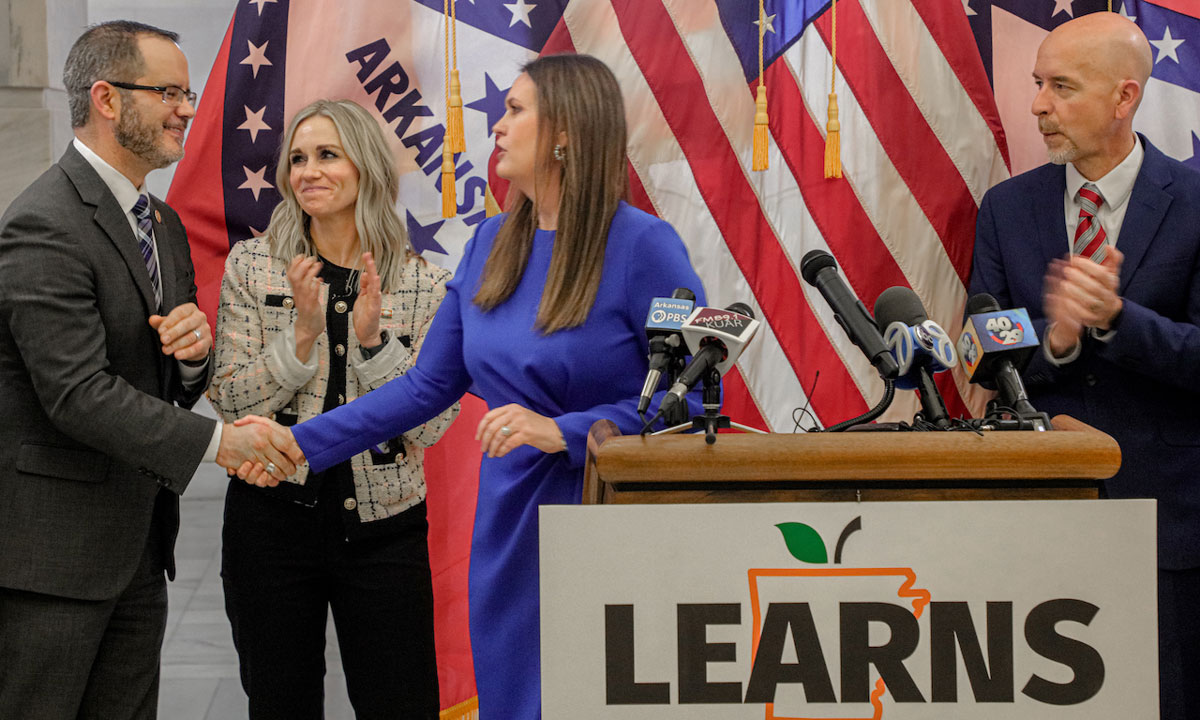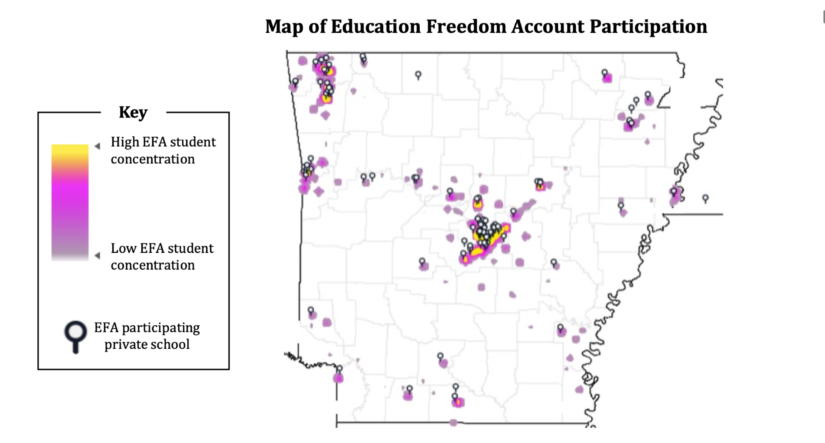Arkansas Education Officials Release First Annual School Voucher Report
There are currently 94 private schools participating in the Education Freedom Account program.

Get stories like this delivered straight to your inbox. Sign up for The 74 Newsletter
Roughly 4,800 students are participating in the first semester of Arkansas’ new K-12 voucher program.
A bulk of those kids are attending the largest, mostly-religious private schools in the state. Of the 94 participating private schools, there are also a number focused on students with special needs.
The new data was reported in the Arkansas Department of Education’s first annual Education Freedom Account report to the state Legislature.
“Arkansas’ Education Freedom Account program has only been around for a few months and already, it’s having a positive impact for kids in the state,” said Alexa Henning, Gov. Sarah Huckabee Sanders’ communications director. “Nearly 5,000 students at almost 100 schools have enrolled in the program, offering families across Arkansas the chance to choose the school that best suits their individual needs and helping every student have access to a quality education.”
The EFA program was one of the primary components of the LEARNS Act; it was also the most controversial.
The program provides state funds for allowable educational expenses, primarily private school tuition this first year. Approximately $6,670 will be available per account for the 2023-2024 school year (Those who were participating in the Succeed Scholarship Program, which targeted primarily individuals with disabilities, received $7,413). The average cost of tuition at EFA schools is around $7,600, according to an Advocate analysis.
The Arkansas Department of Education allocated $46.7 million in state funds for the first year of the voucher program, but the report, which was submitted Saturday, projects the state will only expend about $32.5 million over the first year. So far, about $7 million has been spent.
This year, participation in the program is limited to certain students:
- Students with disabilities.
- Students experiencing homelessness.
- Foster children.
- Children of active duty military members.
- Students enrolled in an “F”-rated school or school in need of Level 5 support.
- Students enrolling in kindergarten for the first time.
The eligibility pool will be expanded over the coming two years until the program is open to all. The department said it has an opportunity in the next few years to deploy “a deliberate and systematic approach to EFA program participation, including, but not limited to, enacting a lottery system with prioritization for certain eligible special populations.”
The majority of students participating in the program this year, about 53%, are in Central Arkansas; another 16% are from Northwest Arkansas, according to the report.

Of those in the program, 44% of students have a disability and 31% are first-time kindergarteners. Less than 5% of students in the program were previously enrolled in a public school.
The third-party company that processes the payments between the state, families and schools has received $176,853 in processing fees so far — roughly 2.7% of the overall program costs.
Other program spending has been on uniform costs and other “required academic expenses.”
The report brought continued criticism from those opposed to vouchers and the LEARNS Act and praise from those who supported it.
Arkansas Education Association President April Reisma, a special education teacher in the Pulaski County Special School District, said the report should be “deeply disturbing to the tax-paying residents of Arkansas.”
“The department cloaks this funding as ‘School Choice’ and ‘Parental Empowerment,’” Reisma said. “To be clear, Arkansas already has school choice. Parents already have the power to choose the school that is best for their child. The guiding principles for the disbursement of these funds leave too many questions than answers. Wouldn’t it be more prudent to use these public funds to expand educational opportunity, high quality school options, use data to inform rulemaking, and ensure strong fiscal stewardship of public funds by investing in our current public schools with that public funding?”
Nicholas Horton, the founder and CEO of the conservative advocacy organization Opportunity Arkansas, wrote that the inaugural report showed the program was working.
“Arkansas is still early into its education freedom journey, but this initial data is very encouraging,” Horton said. “Although it comes as no surprise, it’s now even more clear that there’s a high demand for EFAs across the state – and this is just the beginning.”
Arkansas Advocate is part of States Newsroom, a network of news bureaus supported by grants and a coalition of donors as a 501c(3) public charity. Arkansas Advocate maintains editorial independence. Contact Editor Sonny Albarado for questions: info@arkansasadvocate.com. Follow Arkansas Advocate on Facebook and Twitter.
Get stories like these delivered straight to your inbox. Sign up for The 74 Newsletter

;)